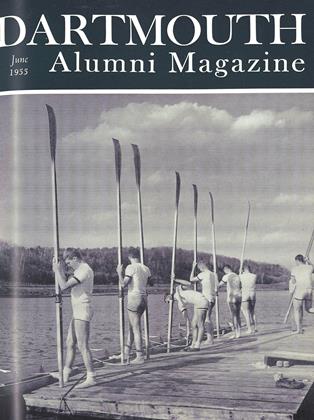THE weather report from New York, on this typically foul spring day, notes that the low record for the date was a nasty 26.8° in 1919- We remember a lot of weather, but we do not recall any such unpleasantness. As a matter of fact, the spring of 1919 bides in our archives as a very salubrious season. The war, if such it may be called by modern standards, was over and we were glad of it. We had cried a little about Rupert Brooke and Alan Seeger, and we were more stricken privately for Joe Emery and Paul Osborn and Ernie Giroux, but most of the guys were on their way home, and it was very sweet to sit on the Senior Eence during the spring recess and start carving canes and castigating Freddy McCrea on the editorial policies of TheDartmouth. Bob Stecher, catcher on the Beta team by virtue of owning the mitt, had little intimation that he would eventually become the president of all the rheumatism in the world, and was chiefly concerned over wangling an introduction to Eddie Shevlin. Gene Markey was bluffing his way with us through English 45' Fat Spears, his teeth repaired after an unfortunate Armistice Night contretemps, was winding up his local medical training and freshman math, having coached the football team the previous fall in consideration of $1002.35, the gross gate for the season.
Ours had been the first sophomore class that President Hopkins had had to take, and it was a hard dose. We suspect he learned eventually that some succeeding sophomore classes also durst more mischief than they willed, but, in any event, things didn't turn out too badly. If the tradition of the Freshman Picture ended in our senior spring, it was only because certain over-ambitious yearlings elected to beat their betters over the head with belaying pins on the lawn of the Ad Building just at getting-to-work time.
The real men, the Cannells, the Cogswells, the Cunninghams, hadn't yet checked back in from the trenches, and they delayed a year before facing off against Lou Little, Bert Bell, Lud Wray and other old Penn meanies at the Polo Grounds; but in our little way we tried to pick up the pieces and help shunt the College back into civilian operation in an ever-loving, blue-eyed world. Jeff Tesreau arrived to coach the baseball team and Tommy Thomson started breaking hurdle records. The godly, complacent over the imminent promise of Prohibition, nodded while Wilder, Vermont, went wet for three months, and it was possible, nay probable, to buy Virginia Dare wine, cool it in the brook on the way home, and face the climb up the river hill with equanimity. There were no great issues, there scarcely seemed to be final exams, and the Phi Delta Theta house burned down twice.
The gracious era really ended in April 1917, and to us was accorded the doubtful privilege of mopping up. Right smack on our heels came the Selective Process, the Cheerless Richardson curriculum and the deification of the social sciences, the scheduling of Harvard, Yale and Princeton, and an increase in tuition to $200. The roaring twenties roared in and the lost generation took control - so overweening in their lostness that they refused their predecessors credit for never having been anywhere in the first place.
Do students today have time to fill their notebooks with little threnodies, or with pictures of sad little cats? Does anyone ever write a ballade a doublerefrain or a rondeau? Do young instructors entertain each other while proctoring by dashing off off-color limericks about the personalities mentioned in the examination paper? Is the advent of . Easter still hailed in front of the Hanover Inn at midnight? We suppose so, although we are no longer vouchsafed glimpses of such frivolities. Probably some of our younger mathematicians have devised a modernday equivalent to John Poor's "Tom Cat Constant." Possibly amateur stagehands still take pride in having the final paint drying on the sets during the overture. Some squeaking Cleopatra may even now don a top hat and read the Declaration of Independence at five a.m. on July 4. Perhaps not, but we hold this truth to be self-evident, that our cottage industries, though they may fail in charm today, were for us enticing in the extreme.
 View Full Issue
View Full Issue
More From This Issue
-
 Feature
Feature"The Real Business"
June 1955 -
 Feature
FeatureTIMOTHY WAS BEFORE YOU
June 1955 By DANIEL CHASE '14 -
 Feature
FeatureOPERATION BOOTSTRAP
June 1955 By FRANK PEMBERTON -
 Article
ArticleStudent Report
June 1955 -
 Class Notes
Class Notes1918
June 1955 By ERNEST H. EARLEY, RICHARD A. HOLTON -
 Class Notes
Class Notes1923
June 1955 By CHESLEY T. BIXBY, THEODORE D. SHAPLEIGH
BILL McCARTER '19
-
 Article
ArticleNot So Long Ago .... Peerades
November 1933 By Bill McCarter '19 -
 Article
ArticleNot So Long Ago .... Fires
February 1934 By Bill McCarter '19 -
 Article
ArticleThe Hanover Scene
March 1953 By BILL McCARTER '19 -
 Article
ArticleThe Hanover Scene
June 1953 By BILL McCARTER '19 -
 Article
ArticleThe Hanover Scene
May 1955 By BILL McCARTER '19 -
 Article
ArticleTHE HANOVER SCENE
By BILL McCARTER '19







